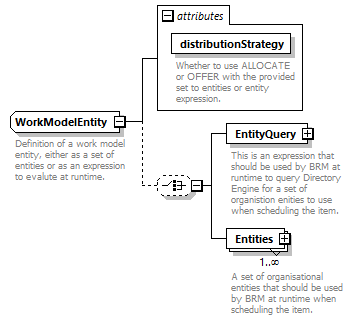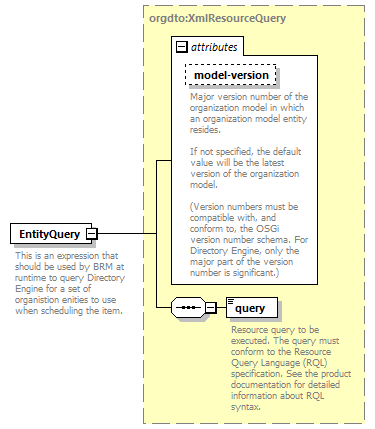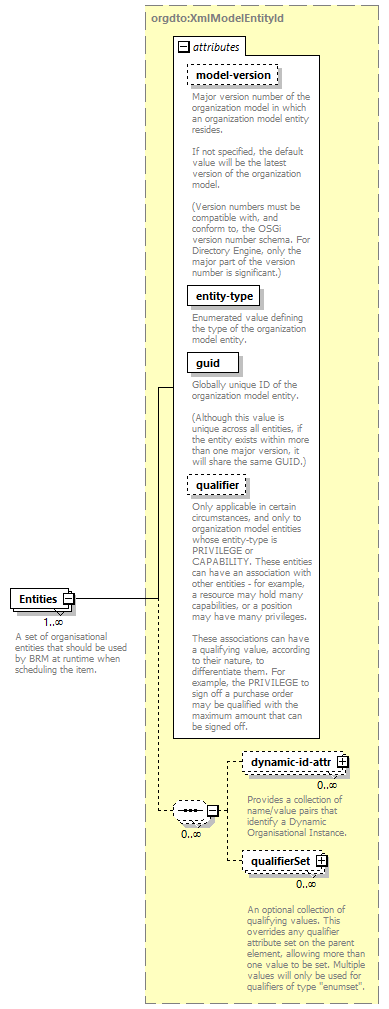| diagram |  |
||||||||||||||
| namespace | http://api.brm.n2.tibco.com | ||||||||||||||
| children | EntityQuery Entities | ||||||||||||||
| used by |
|
||||||||||||||
| attributes |
|
||||||||||||||
| annotation |
|
||||||||||||||
| source | <xs:complexType name="WorkModelEntity"> <xs:annotation> <xs:documentation>Definition of a work model entity, either as a set of entities or as an expression to evalute at runtime.</xs:documentation> </xs:annotation> <xs:choice minOccurs="0"> <xs:element name="EntityQuery" type="orgdto:XmlResourceQuery"> <xs:annotation> <xs:documentation>This is an expression that should be used by BRM at runtime to query Directory Engine for a set of organistion enities to use when scheduling the item.</xs:documentation> </xs:annotation> </xs:element> <xs:element name="Entities" type="orgdto:XmlModelEntityId" maxOccurs="unbounded"> <xs:annotation> <xs:documentation>A set of organisational entities that should be used by BRM at runtime when scheduling the item.</xs:documentation> </xs:annotation> </xs:element> </xs:choice> <xs:attribute name="distributionStrategy" type="DistributionStrategy" use="required"> <xs:annotation> <xs:documentation>Whether to use ALLOCATE or OFFER with the provided set to entities or entity expression.</xs:documentation> </xs:annotation> </xs:attribute> </xs:complexType> |
attribute WorkModelEntity/@distributionStrategy
| type | DistributionStrategy | |||||||||
| properties |
|
|||||||||
| facets |
|
|||||||||
| annotation |
|
|||||||||
| source | <xs:attribute name="distributionStrategy" type="DistributionStrategy" use="required"> <xs:annotation> <xs:documentation>Whether to use ALLOCATE or OFFER with the provided set to entities or entity expression.</xs:documentation> </xs:annotation> </xs:attribute> |
element WorkModelEntity/EntityQuery
| diagram |  |
||||||||||||||
| type | XmlResourceQuery | ||||||||||||||
| properties |
|
||||||||||||||
| children | query | ||||||||||||||
| attributes |
|
||||||||||||||
| annotation |
|
||||||||||||||
| source | <xs:element name="EntityQuery" type="orgdto:XmlResourceQuery"> <xs:annotation> <xs:documentation>This is an expression that should be used by BRM at runtime to query Directory Engine for a set of organistion enities to use when scheduling the item.</xs:documentation> </xs:annotation> </xs:element> |
element WorkModelEntity/Entities
| diagram |  |
||||||||||||||||||||||||||||||||||||||
| type | XmlModelEntityId | ||||||||||||||||||||||||||||||||||||||
| properties |
|
||||||||||||||||||||||||||||||||||||||
| children | dynamic-id-attr qualifierSet | ||||||||||||||||||||||||||||||||||||||
| attributes |
|
||||||||||||||||||||||||||||||||||||||
| annotation |
|
||||||||||||||||||||||||||||||||||||||
| source | <xs:element name="Entities" type="orgdto:XmlModelEntityId" maxOccurs="unbounded"> <xs:annotation> <xs:documentation>A set of organisational entities that should be used by BRM at runtime when scheduling the item.</xs:documentation> </xs:annotation> </xs:element> |
WSDL documentation generated by XMLSpy WSDL Editor http://www.altova.com/xmlspy